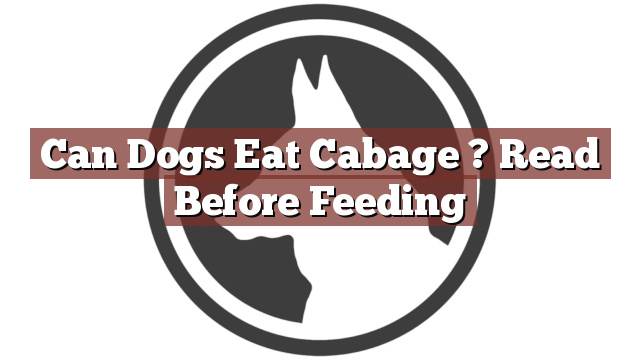Understanding Your Dog’s Dietary Needs
As a responsible pet owner, it is important to understand your dog’s dietary needs. Dogs are primarily carnivorous animals, which means their bodies are adapted to digest and obtain nutrients from meat. However, dogs are also known to be opportunistic eaters and can consume a variety of foods. While it is important to provide a balanced and appropriate diet for your furry friend, certain human foods can be safe for dogs in moderation.
Can Dogs Eat Cabbage? Read Before Feeding
Can dogs eat cabbage? The answer is yes, dogs can eat cabbage. Cabbage is a nutritious vegetable that can offer some health benefits for your canine companion when given as an occasional treat. It is low in calories and contains fiber, vitamins C and K, as well as minerals like calcium and potassium. However, moderation is key when feeding cabbage to your dog, as excessive amounts can lead to gastrointestinal upset such as gas or diarrhea.
Pros and Cons of Feeding Cabbage to Your Dog
Feeding cabbage to your dog can have its pros and cons. On the positive side, cabbage is rich in nutrients and antioxidants that can support your dog’s overall health. It can help boost their immune system, aid in digestion, and promote healthy skin and coat. Additionally, cabbage is a good source of dietary fiber, which can assist with regular bowel movements and prevent constipation.
However, there are also some potential downsides to consider. Cabbage contains compounds called thiocyanates, which can interfere with the functioning of the thyroid gland in large amounts. This is particularly important for dogs with pre-existing thyroid issues. Additionally, some dogs may have difficulty digesting cabbage, leading to gastrointestinal discomfort. It is important to introduce cabbage slowly into your dog’s diet and monitor for any adverse reactions.
Conclusion: Considerations for Feeding Cabbage to Your Canine Companion
While dogs can eat cabbage, it should only be given as an occasional treat in small amounts. Before introducing cabbage to your dog’s diet, it is always best to consult with your veterinarian, especially if your dog has any underlying health conditions. Remember to remove the tough outer leaves and core of the cabbage, and chop it into small, manageable pieces before feeding it to your furry friend. By understanding your dog’s dietary needs and making informed choices, you can ensure that they enjoy a healthy and balanced diet.
Thank you for taking the time to read through our exploration of [page_title]. As every dog lover knows, our furry friends have unique dietary needs and responses, often varying from one canine to another. This is why it's paramount to approach any changes in their diet with caution and knowledge.
Before introducing any new treats or making alterations to your dog's diet based on our insights, it's crucial to consult with a veterinarian about [page_title]. Their expertise ensures that the choices you make are well-suited to your particular pet's health and well-being.
Even seemingly harmless foods can sometimes lead to allergic reactions or digestive issues, which is why monitoring your dog after introducing any new food item is essential.
The content provided here on [page_title] is crafted with care, thorough research, and a genuine love for dogs. Nevertheless, it serves as a general guideline and should not be considered a substitute for professional veterinary advice.
Always prioritize the expert insights of your veterinarian, and remember that the health and happiness of your furry companion come first.
May your journey with your pet continue to be filled with joy, love, and safe culinary adventures. Happy reading, and even happier snacking for your canine friend!

